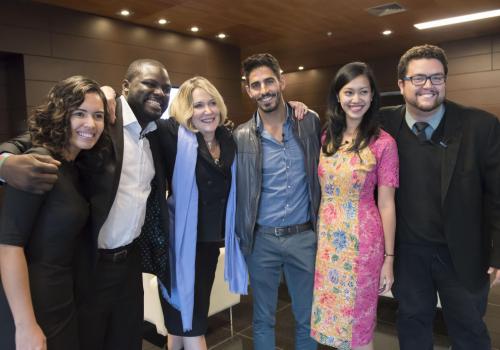
Typical street scene in Santa Ana, El Salvador. (Photo: iStock)
IMF Survey : Youth Unemployment Gap Can Be Bridged through Education, Inclusion
October 8, 2015
- Youth make up about 40 percent of the world’s unemployed
- In the Middle East and North Africa, one-third of young people cannot find work
- Recipe for success: passion, confidence, and connections
Youth leaders from around the world came together at the IMF’s Annual Meetings “Youth Dialogue” to share views and personal experiences on the role of education in addressing youth unemployment and on how to bring more youth into the formal sector, which offers better career prospects and social and job protection.

Youth leaders spoke of the current challenges of youth unemployment and their views on possible solutions (photo: Ryan Rayburn/IMF)
YOUTH DIALOGUE
There are more young men and women who are educated, more proficient with technology, and more adaptable than any other generation, yet they face greater difficulties in finding a job, said, IMF Deputy Managing Director Carla Grasso in opening remarks. She spoke about the potential of the 1.8 billion young people around the world to shape our global future and pointed to an “apparent mismatch between the skills employers and businesses are looking for and what young people are learning at schools, universities, and vocational training centers.”
Challenging employment outlook
Journalist and moderator of the discussion Ahmed Shihab-Eldin posed a number of questions to youth leaders from Africa, Asia, and Latin America on the current challenges of youth unemployment and their views on possible solutions.
Access to technology and the internet and to networking and learning tools, as well as having globally connected institutions that bring best practices featured prominently in the discussion. Mariel Renteria, the 2015 President of CADE Universitario, Peru, said one of the great challenges is connecting and networking with people who can inspire. She was optimistic about gender equality and saw increasing number of women who were successful in technology. She thought that Peru could be more connected globally as “only a small percentage of Peruvians have access to technology,” particularly with regard to access to education online.
Education and the role of teachers, unequal access to employment opportunities and a “brain drain” with young people seeking opportunities abroad also played a role. Iyinoluwa Aboyeji, African entrepreneur and co-founder of Andela, a software training company based in Nigeria that connects top employers with untapped talent in Africa, claimed the main reason for unemployment is that the education system is not aligned to the job market. But with the current influx of capital to Africa, youth have a great opportunity to capitalize on new jobs over the next 20 years.
Amanda Putri Witdarmono, founder of We the Teachers in Indonesia, brought up the growing apathy toward teachers and the importance of role models. “Very few kids want to be teachers,” she said. “It is not the most wanted profession and not the most prestigious. This poses serious challenges because teachers have to update their skills.”
Confidence and optimism key
The panelists’ advice to youth entering the job market was to remain confident and optimistic, to seize the moment and to stay connected. Joao Felipe Scarpelini, activist, social entrepreneur, and youth advisor in the UN for Somalia said, “You have to know what you are passionate about. If you are grounded in your community and know what needs to be done, you don't need to find a job that lasts 50 years. So start; get experience.”
Daniel Maurate, Peru’s Minister of Labor and Employment Promotion, described his own journey as an “immigrant” from rural Peru and the difficulties of integrating into a new society. He emphasized the importance of employment promotion, especially through building human capital. His advice to youth was the importance of self-esteem, saying, “You need to respect yourself and where you came from.” He added that vocational studies, as well matching skills to jobs, were important aspects for youth employment.
Panelists agreed that governments should consult and engage youth at an early stage of policymaking, to reduce red tape, to improve technical infrastructure and to improve the way they communicate with youth in their outreach and engagement.

(from left: Mariel Renteria , Iyinoluwa Aboyeji, Carla Grasso, Ahmed Shihab-Eldin, Amanda Putri Witdarmono, and Joäo Felipe Scarpelini)







